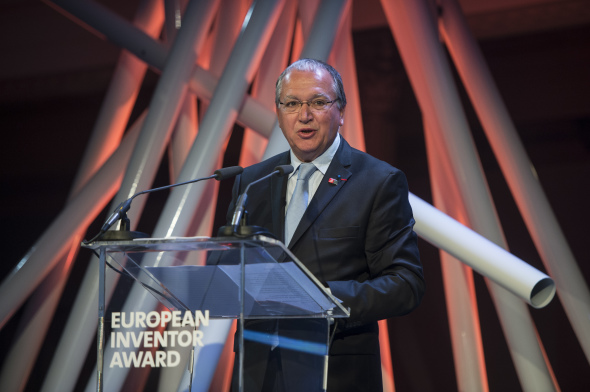
The European Patent Office (EPO) presented the European Inventor Award 2014 today in Berlin honouring outstanding inventors for their contribution to social, economic and technological progress. The award ceremony, held at the former Kaiserliches Telegrafenamt (Imperial Telegraph Office) in Germany’s capital, was attended by some 500 guests from the fields of business, science, culture and politics, including German Federal Minister of Justice and Consumer Protection Heiko Maas.
The international jury selected the winners from 15 finalists, themselves selected from over 300 proposals for individual inventors and inventor teams put forward for the 2014 award. The winners are: Artur Fischer (Germany) in the category “Lifetime achievement”, Koen Andries/Jérôme Guillemont (Belgium/France) in “Industry”, Peter Holme Jensen (Denmark) in “Small and medium-sized enterprises”, Christofer Toumazou (UK) in “Research” and Charles W. (“Chuck”) Hull in “Non-European countries”. In addition, the Popular Prize was awarded to public favourite Masahiro Hara and his team, who received nearly 30% of the more than 20 000 votes cast online.
The winners at a glance:
- Lifetime achievement: With over 1 100 applications for patents and utility models, Artur Fischer (Germany) is one of the most prolific inventors of all time. His invention and namesake, the expansion plug (or “Fischer wall plug”) revolutionised the construction industry in 1958 and has been used billions of times around the world ever since. Other innovations which have earned him worldwide recognition include the first synchronised photo flash for cameras and his “fischertechnik” toy building sets. Additional information here.
- Industry: Koen Andries (Belgium), Jérôme Guillemont (France) and team were distinguished for their efforts in developing the first new effective tuberculosis (TB) drug in 40 years. Thanks to the research team led by Andries and Guillemont, the disease – including multi-drug resistant forms – can now be treated successfully. The innovative drug quickly cuts off the energy supply in TB bacteria, significantly reducing treatment times and enabling a full recovery. Additional information here.
- Small and medium-sized enterprises (SMEs): Peter Holme Jensen, Claus Hélix-Nielsen and Danielle Keller (Denmark) received the Award for their invention of a water-purifying membrane coated with aquaporins, which purifies water without consuming large amounts of energy. The innovation of this Danish team of chemists relies on the natural filtering function of so-called aquaporins. Unlike conventional methods, it does not require an elaborate filtration system based on energy- and cost-intensive hydrostatic pressure. Additional information here.
- Research: Christofer Toumazou (United Kingdom) won in the Research category with his invention of a quick DNA test which can decipher the genetic makeup of individuals within minutes, without the need for lab work – a milestone along the path to innovative medical healthcare with a preventive focus. The innovation is based on a microchip that detects deviations in an individual human genome. The chip can be inserted into a USB stick, providing results that are viewable directly on a computer.Additional information here.
- Non-European countries: Charles W. Hull (United States) received the European Inventor Award for his invention of 3D printing – a technology that is currently in use in numerous fields and that has triggered a veritable revolution in manufacturing. Although a multitude of different procedures for 3D printing now exist, they all build on Hull’s original invention. Additional information here.
- Popular Prize: Masahiro Hara, Takayuki Nagaya and team (Japan): It is hard to imagine day-to-day life without the QR (Quick Response) code they invented. Among other things, it is used for managing inventory in factories, administering patient files, tracking biological samples and as a marketing tool. The QR code links the physical world with the virtual realm by means of a smartphone or tablet and the relevant app. Additional information here.
The choice of the public was clear, as nearly 30% of the votes cast went to the Japanese team. Moreover, with over 20 000, the number of votes coming from around the world more than doubled over last year.
“Innovation is absolutely essential for Europe to generate growth and prosperity and secure its position among the leading industrial regions,” said EPO President Benoît Battistelli at the award ceremony. “All of the inventors we are honouring here today have introduced game-changing technological innovations in their respective fields. Their achievements improve people’s everyday lives, and represent substantial contributions to tackling major global challenges such as climate change, access to clean drinking water and improving health. Their ingenuity and creativity are indicative of Europe’s position as a leading technology region. And patents play a major role in protecting this status on a daily basis.”